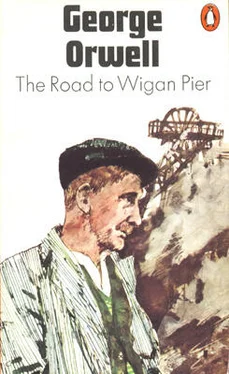George Orwell - The Road to Wigan Pier
Здесь есть возможность читать онлайн «George Orwell - The Road to Wigan Pier» весь текст электронной книги совершенно бесплатно (целиком полную версию без сокращений). В некоторых случаях можно слушать аудио, скачать через торрент в формате fb2 и присутствует краткое содержание. Жанр: Классическая проза, на английском языке. Описание произведения, (предисловие) а так же отзывы посетителей доступны на портале библиотеки ЛибКат.
- Название:The Road to Wigan Pier
- Автор:
- Жанр:
- Год:неизвестен
- ISBN:нет данных
- Рейтинг книги:5 / 5. Голосов: 1
-
Избранное:Добавить в избранное
- Отзывы:
-
Ваша оценка:
- 100
- 1
- 2
- 3
- 4
- 5
The Road to Wigan Pier: краткое содержание, описание и аннотация
Предлагаем к чтению аннотацию, описание, краткое содержание или предисловие (зависит от того, что написал сам автор книги «The Road to Wigan Pier»). Если вы не нашли необходимую информацию о книге — напишите в комментариях, мы постараемся отыскать её.
Эссе Оруэлла всегда умные, изысканно-злые и в чем-то парадоксальные.
Сейчас, как и в прошлом, многим они кажутся спорными и «скандальными». Почему? Да потому, что Джордж Оруэлл всегда современен!
The Road to Wigan Pier — читать онлайн бесплатно полную книгу (весь текст) целиком
Ниже представлен текст книги, разбитый по страницам. Система сохранения места последней прочитанной страницы, позволяет с удобством читать онлайн бесплатно книгу «The Road to Wigan Pier», без необходимости каждый раз заново искать на чём Вы остановились. Поставьте закладку, и сможете в любой момент перейти на страницу, на которой закончили чтение.
Интервал:
Закладка:
The meals at the Brookers' house were uniformly disgusting. For breakfast you got two rashers of bacon and a pale fried egg, and bread-and-butter which had often been cut overnight and always had thumb-marks on it. However tactfully I tried, I could never induce Mr Brooker to let me cut my own bread-and-butter; he would hand it to me slice by slice, each slice gripped firmly under that broad black thumbs For dinner there were generally those threepenny steak puddings which are sold ready-made in tins — these were part of the stock of the shop, I think — and boiled potatoes and rice pudding. For tea there was more bread-and-butter and frayed-looking sweet cakes which were probably bought as ‘stales’ from the baker. For supper there was the pale flabby Lancashire cheese and biscuits. The Brookers never called these biscuits biscuits. They always referred to them reverently as ‘cream crackers’ — ’Have another cream cracker, Mr Reilly. You'll like a cream cracker with your cheese’ — thus glozing over the fact that there was only cheese for supper. Several bottles of Worcester Sauce and a half-full jar of marmalade lived permanently on the table. It was usual to souse everything, even a piece of cheese, with Worcester Sauce, but I never saw anyone brave the marmalade jar, which was an unspeakable mass of stickiness and dust. Mrs Brooker had her meals separately but also took snacks from any meal that happened to be going, and manoeuvred with great skill for what she called ‘the bottom of the pot’, meaning the strongest cup of tea. She had a habit of constantly wiping her mouth on one of her blankets. Towards the end of my stay she took to tearing off strips of newspaper for this purpose, and in the morning the floor was often littered with crumpled-up balls of slimy paper which lay there for hours. The smell of the kitchen was dreadful, but, as with that of the bedroom, you ceased to notice it after a while.
It struck me that this place must be fairly normal as lodging-houses in the industrial areas go, for on the whole the lodgers did not complain. The only one who ever did so to my knowledge was a little black-haired, sharp-nosed Cockney, a traveller for a cigarette firm. He had never been in the North before, and I think that till recently he had been in better employ and was used to staying in commercial hotels. This was his first glimpse of really low-class lodgings, the kind of place in which the poor tribe of touts and canvassers have to shelter upon their endless journeys. In the morning as we were dressing (he had slept in the double bed, of course) I saw him look round the desolate room with a sort of wondering aversion. He caught my eye and suddenly divined that I was a fellow-Southerner. ‘The filthy bloody bastards!’ he said feelingly. After that he packed his suit-case, went downstairs and, with great strength of mind, told the Brookers that this was not the kind of house he was accustomed to and that he was leaving immediately. The Brookers could never understand why. They were astonished and hurt. The ingratitude of it! Leaving them like that for no reason after a single night! Afterwards they discussed it over and over again, in all its bearings. It was added to their store of grievances.
On the day when there was a full chamber-pot under the breakfast table I decided to leave. The place was beginning to depress me. It was not only the dirt, the smells, and the vile food, but the feeling of stagnant meaningless decay, of having got down into some subterranean place where people go creeping round and round, just like blackbeetles, in an endless muddle of slovened jobs and mean grievances. The most dreadful thing about people like the Brookers is the way they say the same things over and over again. It gives you the feeling that they are not real people at all, but a kind of ghost for ever rehearsing the same futile rigmarole. In the end Mrs Brooker's self-pitying talk — always the same complaints, over and over, and always ending with the tremulous whine of ‘It does seem ‘ard, don't it now?’ — revolted me even more than her habit of wiping her mouth with bits of newspaper. But it is no use saying that people like the Brookers are just disgusting and trying to put them out of mind. For they exist in tens and hundreds of thousands; they are one of the characteristic by-products of the modern world. You cannot disregard them if you accept the civilization that produced them. For this is part at least of what industrialism has done for us. Columbus sailed the Atlantic, the first steam engines tottered into motion, the British squares stood firm under the French guns at Waterloo, the one-eyed scoundrels of the nineteenth century praised God and filled their pockets; and this is where it all led — to labyrinthine slums and dark back kitchens with sickly, ageing people creeping round and round them like blackbeetles. It is a kind of duty to see and smell such places now and again, especially smell them, lest you should forget that they exist; though perhaps it is better not to stay there too long.
The train bore me away, through the monstrous scenery of slag-heaps, chimneys, piled scrap-iron, foul canals, paths of cindery mud criss-crossed by the prints of clogs. This was March, but the weather had been horribly cold and everywhere there were mounds of blackened snow. As we moved slowly through the outskirts of the town we passed row after row of little grey slum houses running at right angles to the embankment. At the back of one of the houses a young woman was kneeling on the stones, poking a stick up the leaden waste-pipe which ran from the sink inside and which I suppose was blocked. I had time to see everything about her — her sacking apron, her clumsy clogs, her arms reddened by the cold. She looked up as the train passed, and I was almost near enough to catch her eye. She had a round pale face, the usual exhausted face of the slum girl who is twenty-five and looks forty, thanks to miscarriages and drudgery; and it wore, for the second in which I saw it, the most desolate, hopeless expression I have ever seen. It struck me then that we are mistaken when we say that’ It isn't the same for them as it would be for us,’ and that people bred in the slums can imagine nothing but the slums. For what I saw in her face was not the ignorant suffering of an animal. She knew well enough what was happening to her — understood as well as I did how dreadful a destiny it was to be kneeling there in the bitter cold, on the slimy stones of a slum backyard, poking a stick up a foul drain-pipe.
But quite soon the train drew away into open country, and that seemed strange, almost unnatural, as though the open country had been a kind of park; for in the industrial areas one always feels that the smoke and filth must go on for ever and that no part of the earth's surface can escape them. In a crowded, dirty little country like ours one takes defilement almost for granted. Slag-heaps and chimneys seem a more normal, probable landscape than grass and trees, and even in the depths of the country when you drive your fork into the ground you half expect to lever up a broken bottle or a rusty can. But out here the snow was untrodden and lay so deep that only the tops of the stone boundary-walls were showing, winding over the hills like black paths. I remembered that D. H. Lawrence, writing of this same landscape or another near by, said that the snow-covered hills rippled away into the distance ‘like muscle’. It was not the simile that would have occurred to me. To my eye the snow and the black walls were more like a white dress with black piping running across it.
Although the snow was hardly broken the sun was shining brightly, and behind the shut windows of the carriage it seemed warm. According to the almanac this was spring, and a few of the birds seemed to believe it. For the first time in my life, in a bare patch beside the line, I saw rooks treading. They did it on the ground and not, as I should have expected, in a tree. The manner of courtship was curious. The female stood with her beak open and the male walked round her and appeared to be feeding her. I had hardly been in the train half an hour, but it seemed a very long way from the Brookers' back-kitchen to the empty slopes of snow, the bright sunshine, and the big gleaming birds.
Читать дальшеИнтервал:
Закладка:
Похожие книги на «The Road to Wigan Pier»
Представляем Вашему вниманию похожие книги на «The Road to Wigan Pier» списком для выбора. Мы отобрали схожую по названию и смыслу литературу в надежде предоставить читателям больше вариантов отыскать новые, интересные, ещё непрочитанные произведения.
Обсуждение, отзывы о книге «The Road to Wigan Pier» и просто собственные мнения читателей. Оставьте ваши комментарии, напишите, что Вы думаете о произведении, его смысле или главных героях. Укажите что конкретно понравилось, а что нет, и почему Вы так считаете.












